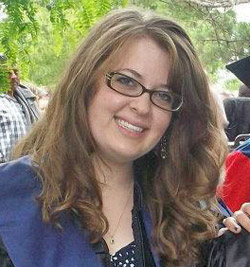Sowers earns spot in MIT chemistry graduate program
Plenty of students rethink their ambitions when confronted by a difficult class. But Molly Sowers ’12 didn’t give up her dream of becoming a mathematician at NASA because math proved too hard, but because accelerated general chemistry provided an even greater challenge.

“It was the only ‘B’ I got at Cornell, but because it was hard it seemed more worthwhile. My next class was organic chemistry and I just loved it,” she said.
Sowers, immersed herself in her newfound passion so fully that she’s now on a doctoral path in chemistry at MIT, one of the top three programs in the country. She will be joined there by Leigh Heathcote ’10, who will be beginning in the same MIT program after spending two years teaching with Teach for America.
Sowers, from Readlyn, Iowa, earned majors in mathematics/statistics and chemistry. She credits Professor Charley Liberko and his Organic Chemistry II course for providing particular inspiration to pursue chemistry.
“He seemed so excited, and with each new concept he told us what type of research he would do if he could. Everything seemed so applicable to real-world questions that it was impossible not to share his excitement.”
During a summer internship at the University of Nebraska, Sowers researched organic compounds designed to be safer for conducting MRI scans on patients with kidney problems. Sowers helped her team greatly increase the yield of two different chemicals, with the goal of decreasing the time to produce a final product while reducing the cost. She also learned a great deal about MRI research in general, the realities of working in a large research lab, and the value of her Cornell preparation.
“I wasn’t entirely prepared for the research atmosphere, but I was prepared for diving into this ridiculous problem and saying ‘I’ll be a champ at this.’ At Cornell, chemical intuition is really emphasized. My lab advisor grilled me a lot on things I hadn’t seen in two years, but I was able to figure things out because I had learned to understand the guiding principles of how chemicals interact rather than just memorizing.”
In addition to the lab work at Nebraska, Sowers did a great deal of background reading, made weekly presentations to her research group, and came up with ideas for future research.
“I was really fortunate to have an advisor who expected a lot out of me,” she said, while adding that much of the extra time she spent in lab was self-motivated.
“Once you start looking at things, you get fascinated,” she said. “For example, when I started reading about how MRIs work, I found myself trying to understand how all medical imaging works.”
Sowers said her extensive preparation in math has helped her be more logical, see how “things fit together”, and appreciate a good challenge. But she also values her Cornell education for the opportunities it gave her beyond math and science.
“Because it’s a small school, everyone teaches you a little something, so I’ve ended up learning some art history without ever taking a course. And I was able to take six English courses just because I like the subject—there is room for that.”
Beyond class, Sowers tutored other Cornell students in math, co-founded a program to mentor high school students struggling with math or science, and performed elementary school mentoring as part of Youth Advocates, her Living Learning Community.
For the future, she currently envisions a position in academia. But one of the reasons she chose MIT is because of their focus on developing and cultivating start-up ventures, and she’s excited to begin making connections with some of the country’s brightest scientists.



